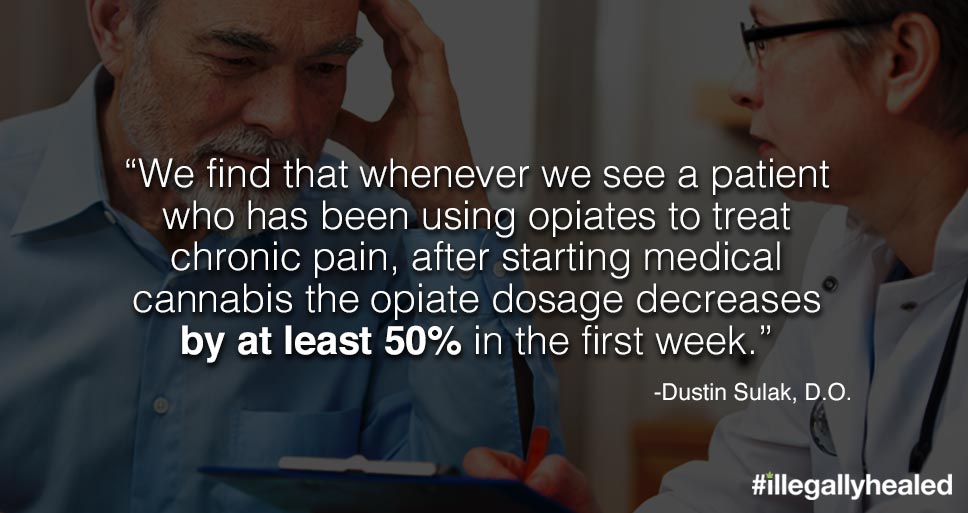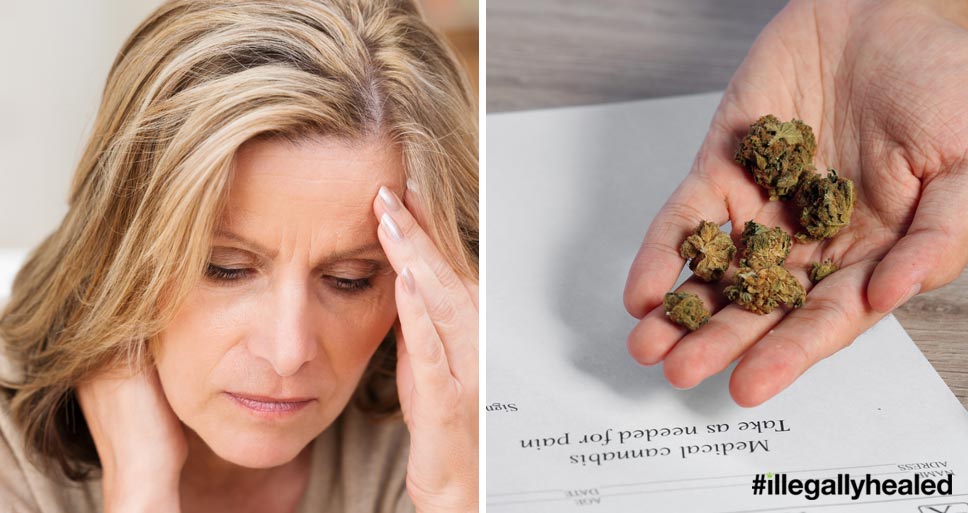Chronic pain and opiate addiction have ruined countless lives and changed the landscape of medicine.

Dustin Sulak, D.O. is a licensed osteopathic physician.
Some patients feel let down by the medical system when they are denied effective treatment for chronic pain. Others feel injured by medical providers who have started them on opiate medications that have led to addiction and ruined their lives. Healthcare providers feel frustrated that they cannot do more to safely help patients with chronic pain, guilty for providing effective short-term treatments with harmful long-term effects, and depleted of compassion for patients who need help.
How does cannabis work therapeutically? Dr. Dustin Sulak of Healer.com explains…
“Luckily, there is another solution that is safe, effective, and sustainable. Plus, patients can grow their own. The vast majority of medical cannabis patients use this herbal medicine to treat chronic pain.” -Dustin Sulak, D.O.
The providers at my medical practice are amazed by the results of medical cannabis in the treatment of chronic pain. Patient after patient tells a similar story, and it goes something like this: “I cut my opiate usage drastically, I’m sleeping better, feeling happy, and enjoying my life more, all with less side effects.”

Dr. Sulak is the medical director of Integr8 Health which cares for over 18,000 patients.
We find that whenever we see a patient who has been using opiates to treat chronic pain, after starting medical cannabis the opiate dosage decreases by at least 50% in the first week. It’s often more like a 60-80% reduction. Many patients go on to completely discontinue opiate medications over the next several months. They often reduce or discontinue other pain medications as well, including anti-depressants and anti-seizure drugs.
Scientific research tells the same story. A review article published in Life Sciences (2004) concludes, “The administration of low doses Tetrahydrocannabinol (THC) in conjunction with low doses of morphine seems to be an alternative regimen that reduces the need to escalate opioid dose while increasing opioid potency.” An animal study found that adding a small amount of THC increased the effectiveness of morphine by four to twelve times.
And while cannabinoids, like THC, can work together with opioids to increase potency in the pain centers of the brain, there isn’t a significant effect on the brainstem, the area responsible for decreased heart rate, slower breathing, and ultimately death in the case of an opiate overdose. This means that using cannabis with opioids is safer than using opioids alone.
Patients Are Starting to Figure This Out
A study published in the Harm Reduction Journal (2009) looked at 350 medical cannabis users, and found that 65% of them were using cannabis as a substitute for prescription drugs, 40% were using it as a substitute for alcohol, and 26% were using it as a substitute for illicit drugs. Three of the subjects used cannabis to help them quit smoking tobacco. The most common reasons for the substitution were less adverse side effects, better symptom management, and less withdrawal.
So while we all were told that cannabis is dangerous because it is a “gateway drug,” scientists are now calling it an, “exit drug” within the framework of harm reduction. The goal is to substitute a safer drug for one that’s more dangerous in patients who are unable to achieve total abstinence.
And cannabis is certainly safer than most of our current options for treating chronic pain. In 1999, the Institute of Medicine published a report that stated, “Except for the harms associated with smoking, the adverse effects of cannabis use are within the range tolerated for other medications,” and “there is no conclusive evidence that marijuana causes cancer in humans.”
Unlike opiate medications, cannabis can remain effective at a low dose for years or decades. While opiates can numb the pain and disconnect the mind from the body, increasing risk for inappropriate activity and re-injury, cannabis often does the opposite. Patients report that after using cannabis, the pain is still there but is less intense, less bothersome, and they no longer have to dwell on it. They often feel more connected to their bodies because they no longer have to retreat from the pain. Patients feel able to reclaim their lives from the constant focus on pain.
Cannabis May Not Be For Everyone
This does not mean that cannabis is a great medicine for everyone. It has been shown to cause addiction and withdrawal symptoms, such as craving for cannabis, decreased appetite, sleep difficulty, weight loss, and irritability. A study published in the Archives of General Psychiatry found cannabis withdrawal symptoms to be, “similar in type and magnitude to those observed in studies of nicotine withdrawal.”
You Don’t Have to Roll a Doobie
Cannabis does not have to be smoked, as many patients are using tinctures (liquid extracts) and vaporizers (smoke-free inhalation). Certified patients are able to grow their own or purchase the medicine from caregivers or dispensaries.
Pain is a necessary part of life, helping us to know when to avoid danger, change, rest, or ask for help. Unfortunately, sometimes the pain continues after the threat is gone. Patients in chronic pain are often stressed-out, sleep-deprived, and hopeless. These people need our compassion, understanding, and a safe treatment.
While opiate prescriptions are increasing at an alarming rate, addiction is ruining families, causing crime, and creating an immense economic burden, and medical providers feel helpless and frustrated, a safe solution might be growing in your neighbor’s back yard.
This article was originally published on Healer.com

